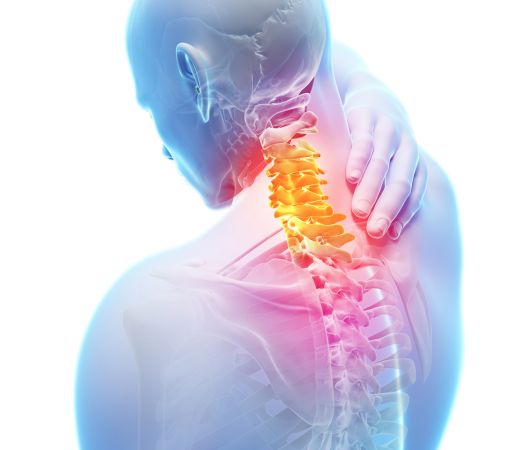Spine Surgeon
Neck Pain Doctor in Mumbai
Neck Pain
Neck pain refers to discomfort or soreness experienced in the cervical region of the spine, which encompasses the neck and upper shoulders. In many cases, neck pain is temporary and can be alleviated with rest, gentle exercises, and over-the-counter pain relievers. However, persistent or severe neck pain may warrant medical attention to identify and address the underlying issues, such as herniated discs, arthritis, or nerve compression. Neck pain that does not improve with over-the-counter medications, or is associated with pain going down the arm and/or weakness in muscles needs an assessment by a spine surgeon.
What are the causes and symptoms of neck pain?
Causes of neck pain
- Muscle Strain: Overuse or poor posture can lead to muscle strain, causing tension and discomfort in the neck.
- Poor Ergonomics: Prolonged periods of sitting with incorrect posture, especially while using computers or electronic devices.
- Trauma or Injury: Accidents, falls, or sudden impacts can cause neck injuries, such as whiplash.
- Herniated Discs: Discs between the vertebrae can rupture or bulge, putting pressure on nerves and causing neck pain.
- Arthritis: Degenerative conditions like osteoarthritis or rheumatoid arthritis affecting the neck joints.
Nerve Compression: Conditions such as cervical spondylosis or foraminal stenosis can compress nerves in the neck. - Infections or Inflammation: Infections, such as meningitis, or inflammatory conditions like polymyalgia rheumatica.
- Sleeping Position: Sleeping in an awkward position or using an improper pillow.
Tumors: Rare instances of tumors in the neck or spine.
Symptoms of neck pain
- Aching: Common symptoms associated with muscle strain, poor posture, or overuse.
- Stiffness: Difficulty moving the neck, often accompanied by a sensation of tightness.
- Limited Range of Motion: Difficulty turning the head or moving it in certain directions.
- Immediate Pain: Following trauma or injury, such as whiplash from an accident.
- Headaches: Especially at the base of the skull, commonly associated with muscle tension or cervical issues.
Numbness or Tingling: Radiating sensations down the arms, which may indicate nerve compression. - Weakness: Especially in the arms, often associated with nerve-related issues.
- Discomfort upon Waking: Resulting from sleeping in an awkward position or using an improper pillow.
- Persistent Pain: Especially concerning if it lasts for an extended period or worsens over time.
How to diagnose neck pain?
- Lab Tests: Blood and urine tests, including a complete blood count (CBC), urinalysis, and markers of inflammation, can help identify non-musculoskeletal causes of neck pain, such as infections, rheumatological conditions, or cancers.
- Magnetic Resonance Imaging (MRI): MRI scans provide detailed images of the spinal cord, nerves, bone marrow, and soft tissue. They can detect slipped discs, signs of infection, and masses like cysts or tumors that may be causing neck pain.
- Computed Tomography (CT) Scan: In cases where an MRI is unavailable, a CT scan may be used to reveal bone spurs and signs of bone deterioration. Some bony tumors are also diagnosed on CT scan.
- X-rays: X-rays are useful in revealing issues with bones and soft tissues contributing to neck pain. They can identify problems such as cervical alignment issues, fractures, slipped discs, and arthritis.
- Electrodiagnostic Tests:These tests, such as nerve conduction studies and electromyography to assess nerve function and muscle response, especially if MRI is contraindicated.
What are the complications of neck pain?
If left untreated, neck pain can lead to several complications, including:
- Chronic Pain: Persistent neck pain may become chronic, affecting daily life and diminishing overall well-being.
- Reduced Range of Motion: Untreated neck issues can result in stiffness and decreased flexibility, limiting the range of motion in the neck.
- Muscle Weakness: Prolonged neck pain can cause muscle weakness, affecting the surrounding muscles and potentially leading to imbalances.
Headaches: Untreated neck problems may contribute to tension headaches or migraines. - Nerve Impingement: Continued strain on the neck may lead to nerve impingement, causing radiating pain, numbness, or tingling in the arms and hands.
- Degenerative Changes: Chronic inflammation and stress may contribute to degenerative changes in the cervical spine, such as osteoarthritis.
What is the treatment for neck pain?
Pain medications and muscle relaxers:
- Over-the-counter or prescription medications, such as nonsteroidal anti-inflammatory drugs (NSAIDs) and muscle relaxants, can help reduce pain and inflammation, promoting muscle healing.
Steroid injections:
- Injections near nerve roots can effectively reduce inflammation and provide relief from pain.
Transcutaneous electrical nerve stimulation (TENS) unit:
- A TENS unit delivers a low-level electrical current in nerves to disrupt pain signals causing discomfort. This is delivered through the skin and causes improvement in symptoms.
Surgery:
While most instances of neck pain do not require surgery, it may be considered if vertebrae in the spine have shifted or are exerting pressure on nerves.
Synapse Spine offers specialized care and advanced treatment options for individuals suffering from neck pain. With a dedicated team of spine specialists and state-of-the-art facilities, Synapse Spine provides comprehensive solutions tailored to each patient’s needs, ensuring effective pain management and improved quality of life.
Watch more videos of Synapse Spine:
Understanding Loss of Cervical Lordosis/ Straight Neck: Causes and Symptoms with Dr. Anuj Bhide

